The Centre for Seldom Heard Voices is delighted to invite you to a special international guest lecture featuring social anthropological research on ‘pacing adult womanhood’ in precarious situations, here through the case study of young women’s situation in Kosovo. Dr Rozafa Berisha (Manchester/ Prishtina), currently visiting the social anthropology sister programme in the Social Science and Social Work department through our Erasmus+ K107 programme in partnership with University of Prishtina, Kosovo, will present her research on Thursday, 27th April, 15:00 to 17:00 in EB-206. All interested staff and students welcome! More details are available in this poster: Rozafa Berisha poster
/ Full archive
Conversation article: Social media now trumps traditional family networks in Libya – my Facebook survey reached 446,000 women
Abier Hamidi writes for The Conversation about her PhD research around HIV awareness in Libya…
Social media now trumps traditional family networks in Libya – my Facebook survey reached 446,000 women

Prostock-studio via Shutterstock
Abier Hamidi, Bournemouth University
When I told my family and friends I intended to pursue a PhD researching HIV awareness among married women in Libya, my home country, the reaction was not encouraging: “You’d be lucky to even get members of your family to respond,” said one.
They weren’t being unnecessarily pessimistic but rather managing my expectations, considering I was not only researching HIV awareness in a conservative country often perceived oppressive, but I was also looking to recruit women.
Historically, Libyan women have been placed under severe social and cultural constraints that rendered them difficult to reach. Libya is shaped by and works within a patriarchal society where simply approaching women on such a taboo topic as HIV/Aids – which in Libya is often associated with immoral practices such as pre or extra-marital sex, substance abuse and homosexuality – made the research even more complex.
I knew that the lack of confidentiality and the fear of being stigmatised were going to be a problem. So I needed a method that would provide a platform whereby the women can respond to the survey without prying eyes.
This is where the power of online surveys comes in. Using an anonymous, self-completed questionnaire reduces the effect of the topic’s sensitivity and helps reduce people’s fear of the possible social stigma attached to those self-disclosures.
But online surveys have their limitations. In Libya, these include poor telecommunication infrastructure, especially away from the large cities, as well as the high cost of internet access and the relatively poor service there. But the fast-growing smartphone market is encouraging and facilitating internet use in the country. According to the most recent available figures there were 3.14 million internet users in Libya in 2023 – approximately 45.9% of the population.
My questionnaire included five main sections. I asked for some limited demographic information (age, city, educational level, employment status). There were also sections on HIV/Aids related knowledge, responsents’ perceptions of HIV risk, their attitude toward HIV and where they sourced healthcare information. I took particular care to ensure that I was gathering the maximum amount of information while remaining sensitive to Libya’s religious and social contexts.
Armed with approval from the university’s research ethics committee, I sent out a recruitment post with the questionnaire, mainly to family and friends in the Libyan diaspora in the UK and the US. The principle aim of this pilot study was to ensure that the wording, language and questions were understandable and that the mechanics of the survey functioned correctly. Within a month I’d received more than 168 complete questionnaires, which reassured me that sharing the survey with family and friends and asking them to forward the link to their various social and family networks would be the ideal approach for my main research on Libyan women in Libya.
What is ‘wasta’?
Libya has a population of around 7.1 million which is heavily skewed towards large networked tribes and well-established families, meaning the degree of separation across the whole of society is quite small. This has traditionally meant that the best way to get things done is by using these big family or tribal networks. This is known as “wasta”.
Wasta is a common practice of calling on personal connections for assistance. It’s a social norm in most Arab countries, defined by one academic as “a personal exchange system between members of society that is entrenched in the tribal structure of the country”. The concept has been tied to a tribal tradition which obliges those within the group to provide assistance in the same network.
I have a large family in Libya which straddles two different tribes, as well as family friends, so I was confident that wasta was the best approach to take. I sent the link to all the members of my wasta network through WhatsApp and asked them to forward it onto their friends and extended family. I also posted on Twitter and reached out to various Facebook pages. I only needed 323 complete questionnaires and I was confident that method would yield the best response.
Days went by and I only had a handful of responses. Much of the feedback I received from family members was worrying. People said they had exhausted their networks without much success. Clearly, recruitment using wasta wasn’t working. So I decided to fall back on my experiences of working in marketing and created a targeted post, aimed at “women, ages 18-65+ living in Libya, married, divorced, separated and widowed”. In direct contrast to wasta, this didn’t rely on who I know.
Social media has grown massively in popularity as a research tool in recent years. So, bearing in mind that Facebook is the most popular social media platform in Libya, with more than 6 million users, I created a Facebook page with the title, in Arabic: دراسة النساء الليبيات المتزوجات (Research on Libyan married women). I linked in papers I had published in the past (also in Arabic) and the recruitment poster below.
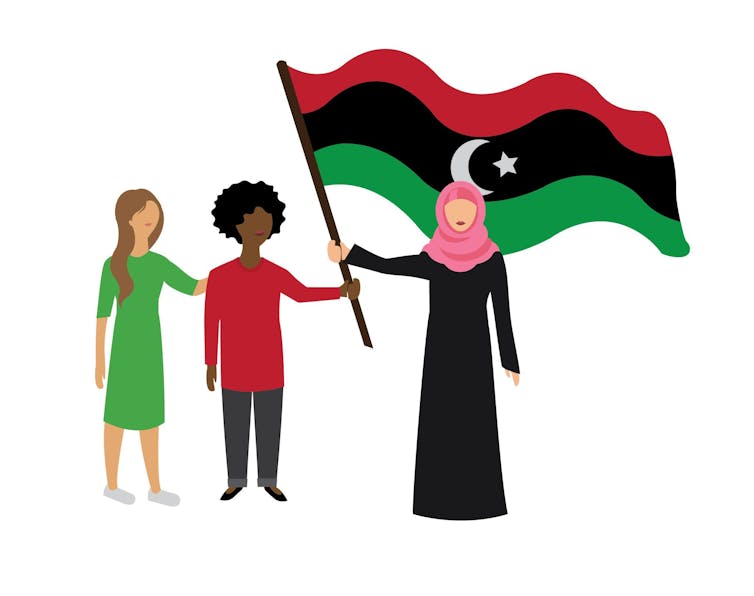
Abier Hamidi, Author provided
I launched the post and the response was immediate, with replies and completed questionnaires and supportive comments coming in fairly rapidly to start with. But within a few days the response rate slowed down and still I wasn’t anywhere near my response target. Then I realised my mistake. The initial post targeting women who are married, divorced, separated or widowed hadn’t taken into account that the majority of women didn’t tend to include their marital status on Facebook. This meant I was only reaching a small percentage of my target audience.
I removed the status and the reach shot up. In six months, my post reached 446,906 women in Libya. The stats were impressive: 59,422 engagements, 1,549 reactions and 703 comments. I received more than 1,000 completed questionnaires.
In the end, this showed me that while for certain things, wasta can yield results, for an issue such as this, Libyan women wanted to ensure their anonymity and the confidentiality of their responses. Social media, which doesn’t mandate use of real names or photographs, was able to offer this in a way that extended family and friends, naturally, never could.![]()
Abier Hamidi, PhD Candidate, Faculty of Health & Social Sciences, Bournemouth University
This article is republished from The Conversation under a Creative Commons license. Read the original article.
BU PhD student publishes in The Conversation
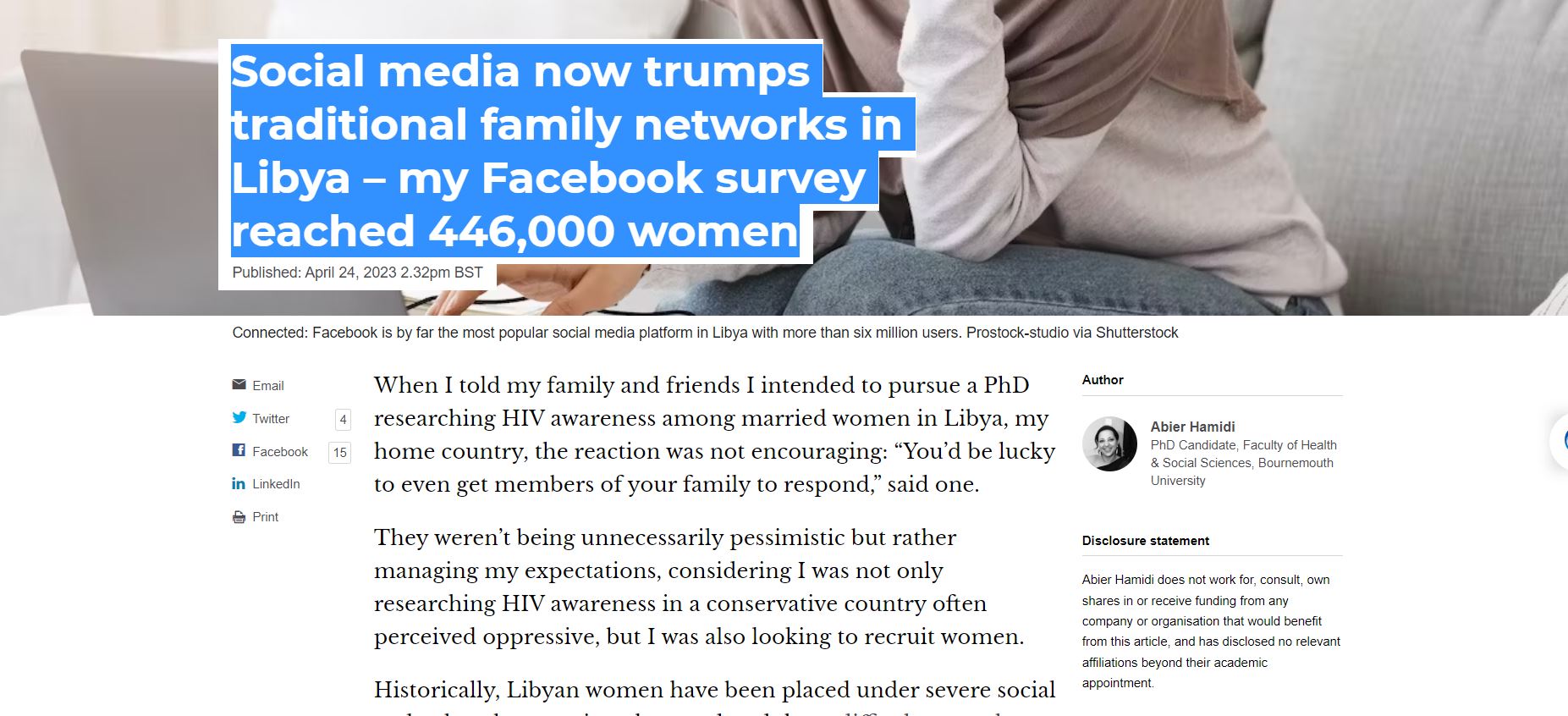 Congratulations the Abier Hamidi, PhD student in the Faculty of Health & Social Sciences (FHSS) whose PhD work was published in The Conversation this week (24 April) under the title Social media now trumps traditional family networks in Libya – my Facebook survey reached 446,000 women. Her piece in The Conversation on the recruitment of female participants for a PhD study in a rather patriarchal society brings together issues of anonymity, gender, and wider social culture.
Congratulations the Abier Hamidi, PhD student in the Faculty of Health & Social Sciences (FHSS) whose PhD work was published in The Conversation this week (24 April) under the title Social media now trumps traditional family networks in Libya – my Facebook survey reached 446,000 women. Her piece in The Conversation on the recruitment of female participants for a PhD study in a rather patriarchal society brings together issues of anonymity, gender, and wider social culture.
This is Abier’s PhD research is supervised by Dr. Pramod Regmi, Senior Lecturer in International Health and the Global Engagement Lead in the Department of Nursing Sciences, and Prof. Edwin van Teijlingen in the Centre for Midwifery, Maternal & Perinatal Health (CMMPH).
Congratulations!
Prof. Edwin van Teijlingen
Funding opportunity: Enhance the impact of environmental sciences research
Natural Environment Research Council (NERC) Knowledge Exchange Fellowships Funding opportunity
Apply for funding to enhance the impact of research in the environmental sciences. NERC knowledge exchange fellowships help you and your stakeholders to share knowledge.
To apply, you must be based at an institution eligible for UK Research and Innovation (UKRI) funding. Your project must focus on the ambitions set out in NERC’s strategic delivery plan and NERC remit areas from UKRI’s strategy plan. Researchers at all career stages are welcome.
Find out more
How to apply
For help and advice on costings and writing your proposal, please contact BU Engagement Officer, Adam Morris at publicengagement@bournemouth.ac.uk
This funding is subject to the same internal processes as external research funding. Before applying, interested PIs (Principle Investigators) should submit a completed e-ITB form (Intention to Bid) by 4 weeks before the deadline, which is 4pm, 14 June 2023
IMIV MRI Research Project Scheme 2023
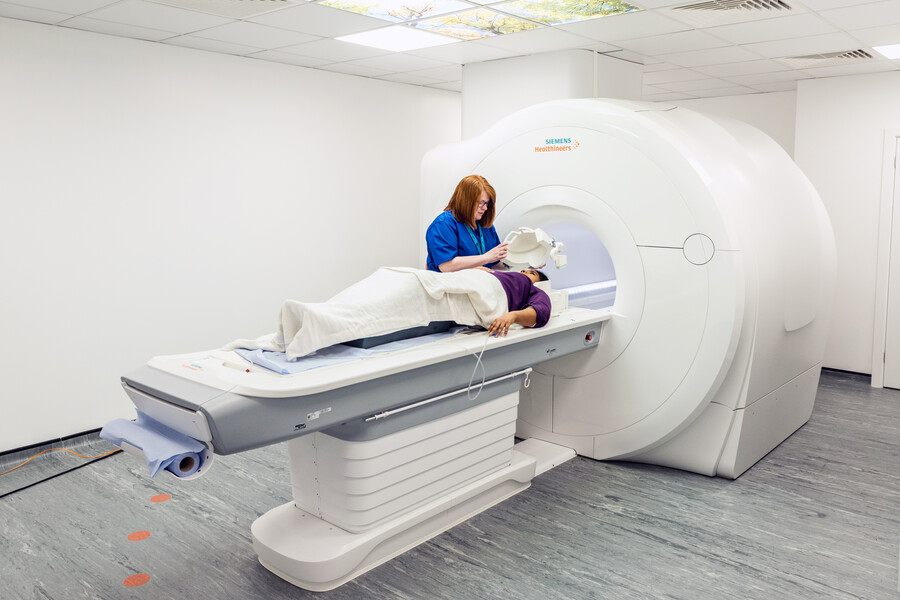 The Institute of Medical Imaging and Visualisation (IMIV) is pleased to announce the launch of the IMIV MRI Research Project Scheme 2023.
The Institute of Medical Imaging and Visualisation (IMIV) is pleased to announce the launch of the IMIV MRI Research Project Scheme 2023.
Under the scheme, two innovative MRI research projects will each be awarded up to 100 hours of scanning time on the IMIV’s state-of-the-art 3T Siemens Lumina MRI scanner. Applications for the scheme are now open.
- The focus of the scheme is on multi-disciplinary and cross-institutional projects, and priority will be given to projects with a clinical partnership.
- All research projects must have a Bournemouth University researcher as lead or co-lead applicant.
- Projects must be able to demonstrate how they will lead to peer-reviewed academic outputs and external funding applications for further MR imaging studies.
- Up to 100 hours of scanning time will be awarded to up to 2 research projects. The award will not cover any additional expenses related to scanning, or other aspects of the project.
- Projects will be expected to start in the 2023-24 academic year.
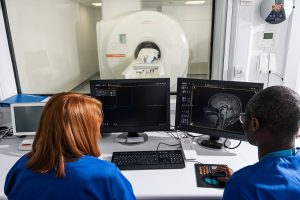 Applications close on Friday 7th July 2023.
Applications close on Friday 7th July 2023.
For further information and an application form, please email imiv@bournemouth.ac.uk
Several BU papers at this week’s BNAC Nepal Study Days
The BNAC (Britain-Nepal Academic Council) twentieth Nepal Study Days (24-25 April) start today in Huddersfield. BU is directly represented through Dr. Pramod Regmi who will be presenting ‘Health Research Priorities and Needs in Migrant Health: A Review of Reviews’ today.  Dr. Regmi based in the Department of Nursing Sciences and Prof. Edwin van Teijlingen in the Department of Midwifery & Health Sciences are also part of the paper ‘Nepal Family Cohort Study: Starting a Longitudinal Population Health Study’ which will be presented by our colleague Dr. Om P. Kurmi from Coventry University.
Dr. Regmi based in the Department of Nursing Sciences and Prof. Edwin van Teijlingen in the Department of Midwifery & Health Sciences are also part of the paper ‘Nepal Family Cohort Study: Starting a Longitudinal Population Health Study’ which will be presented by our colleague Dr. Om P. Kurmi from Coventry University.
There will also be a BU paper on ‘Perceptions Around Covid-19 and Vaccine Hesitancy: A Qualitative Study Among People Living in Kaski, Western Nepal’ , presented by Dr. Preeti Mahato. Preeti is based at Royal Holloway (University of London) and she is also a Visiting Faculty member of FHSS. She’ll presenting a study recently published in PLOS Global Public Health.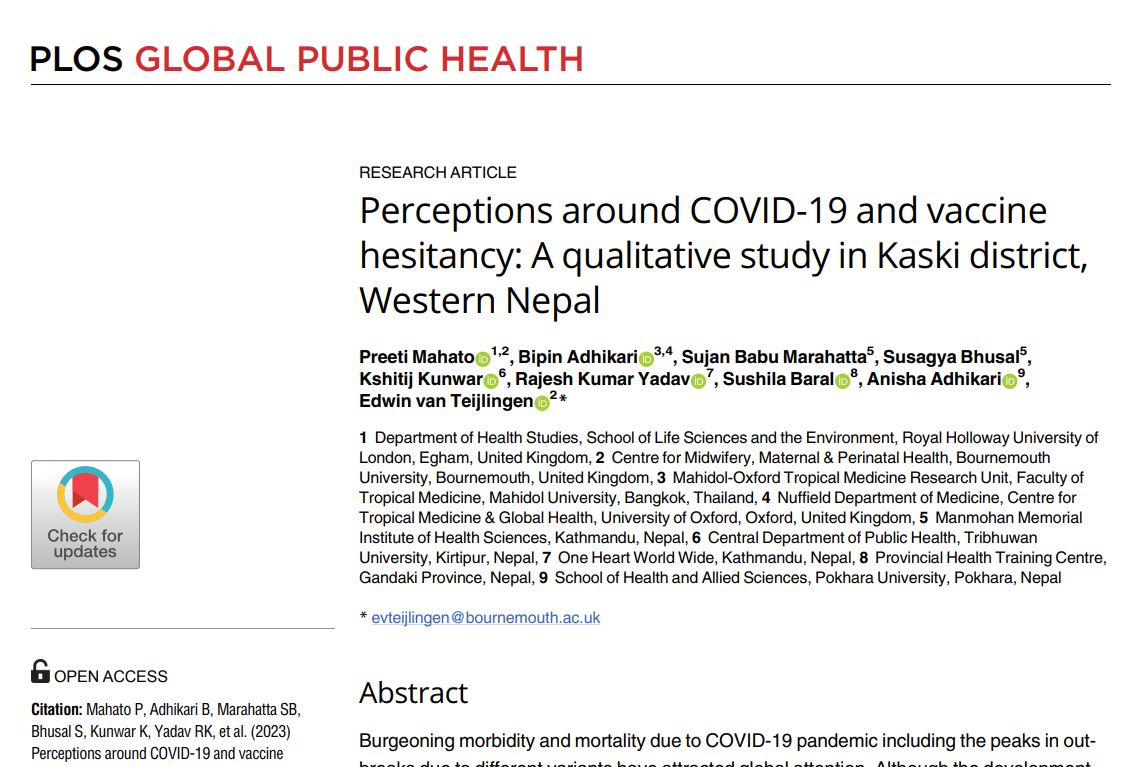
These Nepal Studies Days pay serious attention to our ongoing interdisciplinary study ‘The impact of federalisation on Nepal’s health system: a longitudinal analysis’ which was reported in several national newspapers in Nepal last week. Tomorrow there will be a plenary session by Prof. Simon Rushton, the PI on this project in which BU collaborates. He will be talking about ‘Nepal’s Health System During Federalisation: Emerging Issues and the Co-production of Policy and Practice Recommendations’. Later that day there will be two further presentations based on this large-scale study, the first one by Dr. Sharada P. Wasti followed by one delivered by Dr. Sujata Sapkota.
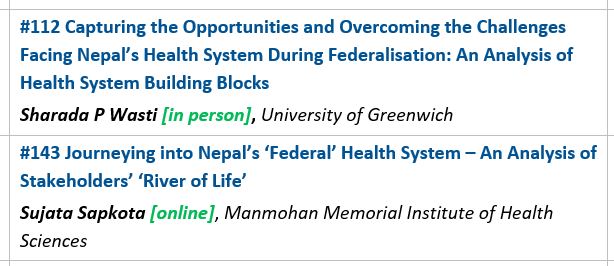
Funding Development Briefings and UKRO visit
UKRO visit to BU
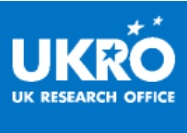 Before going to remining funding development briefings for the rest of this academic year, I would like to remind about UKRO Session for BU academics on 26 April 2023 at 12:30.
Before going to remining funding development briefings for the rest of this academic year, I would like to remind about UKRO Session for BU academics on 26 April 2023 at 12:30.
All BU staff are invited to participate. You can find more details, including agenda, in my previous blog; Zoom link to join the event has been sent to Heads of Departments. If for any reason you cannot get the link, please email me directly and I will send it over to you.
You can still book short individual meeting with BU European Advisor (subject to availability) until Monday mid-day.
Funding Development Briefings
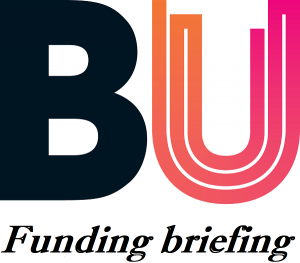 After Easter break, we are making some changes related to weekly funding briefing sessions.
After Easter break, we are making some changes related to weekly funding briefing sessions.
From now on, RDS funding briefing sessions will take place fortnightly. Every second briefing will include academic drop-in sessions for academics willing to ask specific questions to pre-award team members or simply to meet people and have a conversation with those providing bidding support. We will also welcome ideas about how to better organise briefing-like sessions for the next academic year.
Funding spotlights, as part of briefing sessions, will be organised once per month. There are many recordings and presentations from previous briefing sessions available on Brightspace and briefings’ Teams channel. We aim to update pre-award Brightspace content to make it more user friendly in terms of finding exactly what academics are looking for.
Please note – briefing session on 26/04/23 (UKRO annual visit) starts at 12:30 and will be held using Zoom.
We will evaluate results of this approach and analyse feedback from academics to design briefing sessions for the new academic year starting in September 2023. The last briefing session of this academic year will be held on 19 July. Here is the schedule of remaining briefing sessions:
26/04/23 – briefing + spotlight: UKRO annual visit (starting at 12:30)
10/05/23 — briefing + academic drop-in session
24/05/23 – briefing + spotlight: AHRC (subject to availability of AHRC presenter)
07/06/23 – briefing + academic drop-in session
21/06/23 – briefing + spotlight: Marie Curie Fellowships
05/07/23 – briefing + academic drop-in session
19/07/23 – briefing + spotlight: Royal Society
Here is the link for joining remaining briefing sessions (except 26/04/23): Click here to join the meeting
Extensive media coverage in Nepal last week
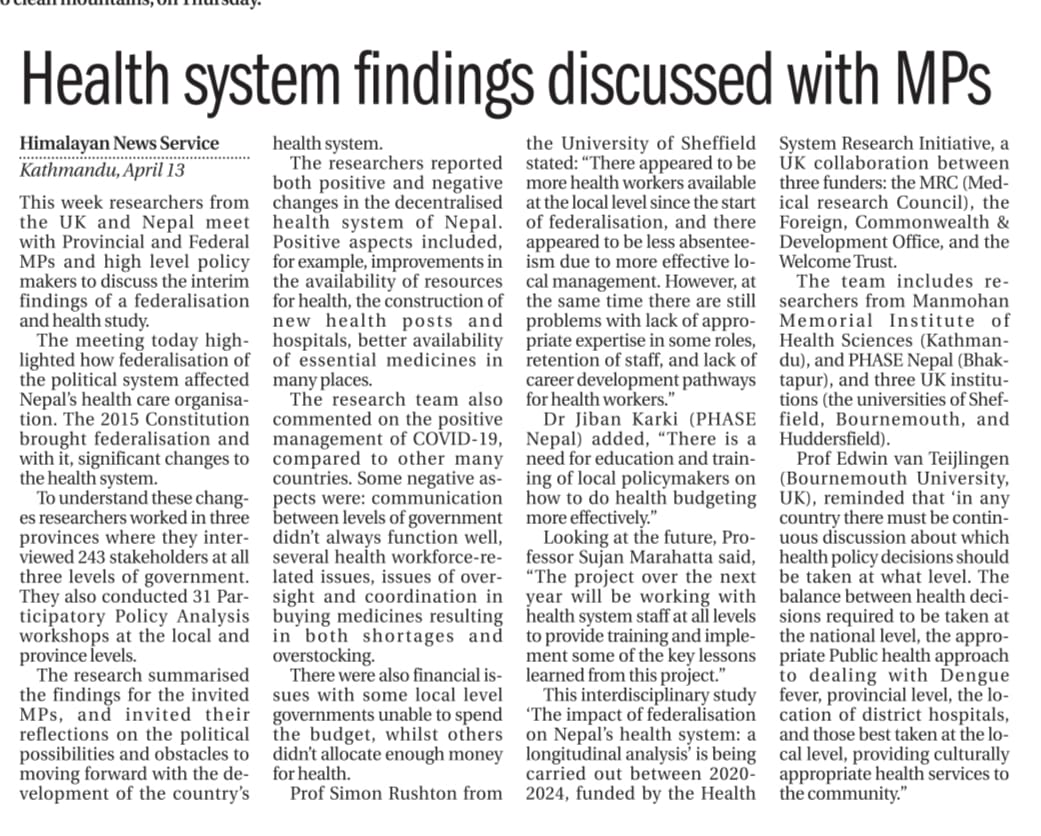 The interdisciplinary research project ‘The impact of federalisation on Nepal’s health system: a longitudinal analysis’ was reported in several national media in Nepal last week. This project running from 2020 to 2024 is, funded by the Health System Research Initiative, a UK collaboration between three funders: the MRC (Medical research Council), the Foreign, Commonwealth & Development Office, and the Welcome Trust.
The interdisciplinary research project ‘The impact of federalisation on Nepal’s health system: a longitudinal analysis’ was reported in several national media in Nepal last week. This project running from 2020 to 2024 is, funded by the Health System Research Initiative, a UK collaboration between three funders: the MRC (Medical research Council), the Foreign, Commonwealth & Development Office, and the Welcome Trust.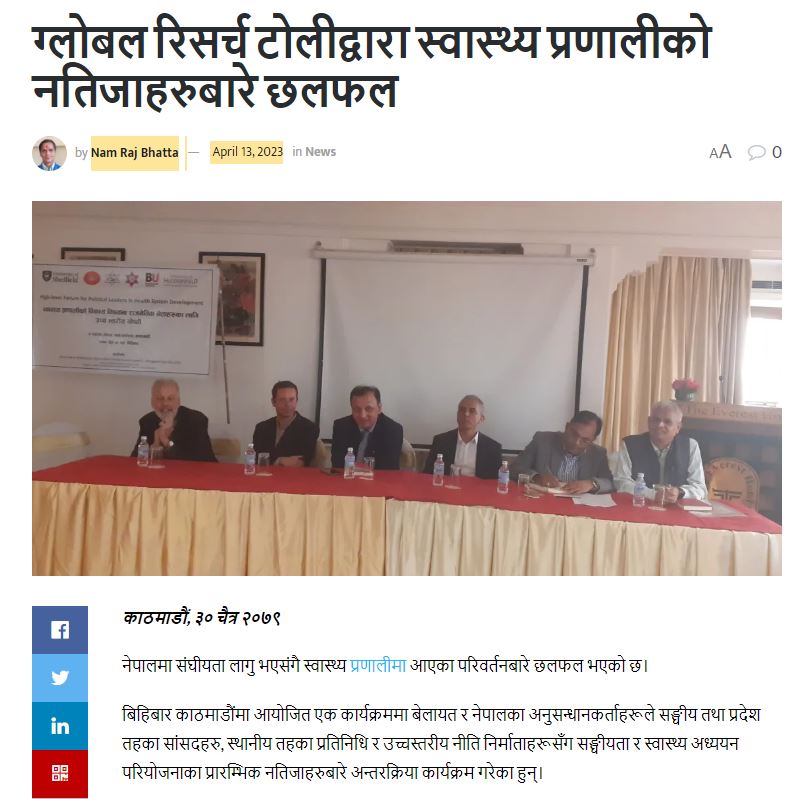
The 2015 Constitution brought federalisation and with it, significant changes to the health system. 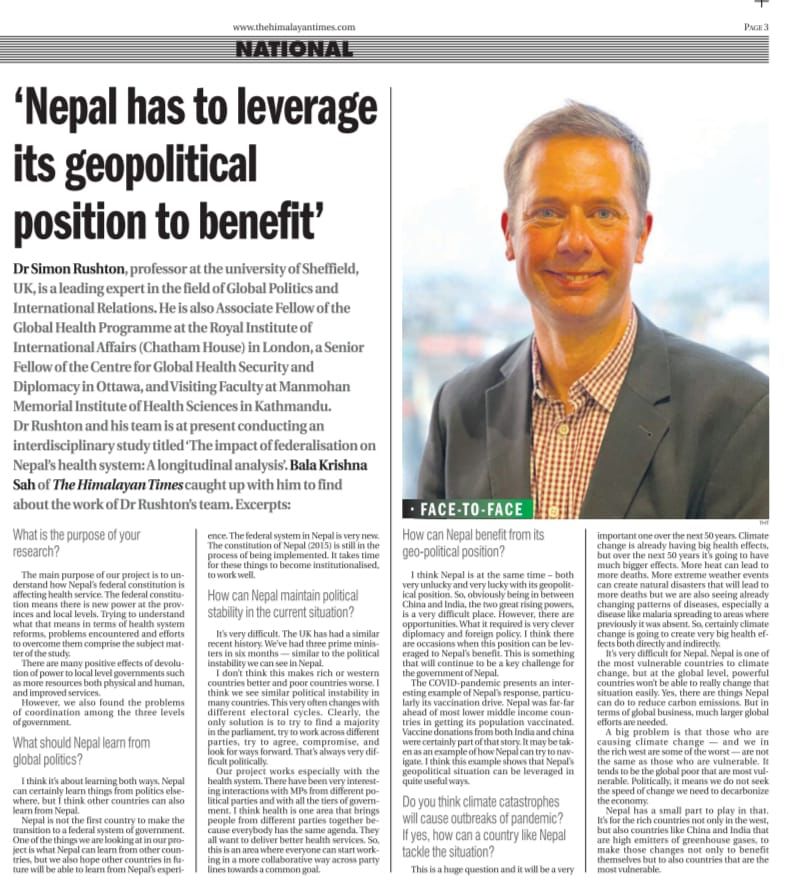 To understand these changes researchers worked in three provinces where they interviewed 243 stakeholders, at all three levels of government. They also conducted 31 Participatory Policy Analysis workshops at local and province levels. The team includes researchers from Manmohan Memorial Institute of Health Sciences (Kathmandu), and PHASE Nepal (Bhaktapur), and three UK institutions (the Universities of Sheffield, Bournemouth, and Huddersfield). It researchers from the UK and Nepal meet with Provincial and Federal MPs to discuss the interim findings of a federalisation and health study.
To understand these changes researchers worked in three provinces where they interviewed 243 stakeholders, at all three levels of government. They also conducted 31 Participatory Policy Analysis workshops at local and province levels. The team includes researchers from Manmohan Memorial Institute of Health Sciences (Kathmandu), and PHASE Nepal (Bhaktapur), and three UK institutions (the Universities of Sheffield, Bournemouth, and Huddersfield). It researchers from the UK and Nepal meet with Provincial and Federal MPs to discuss the interim findings of a federalisation and health study.
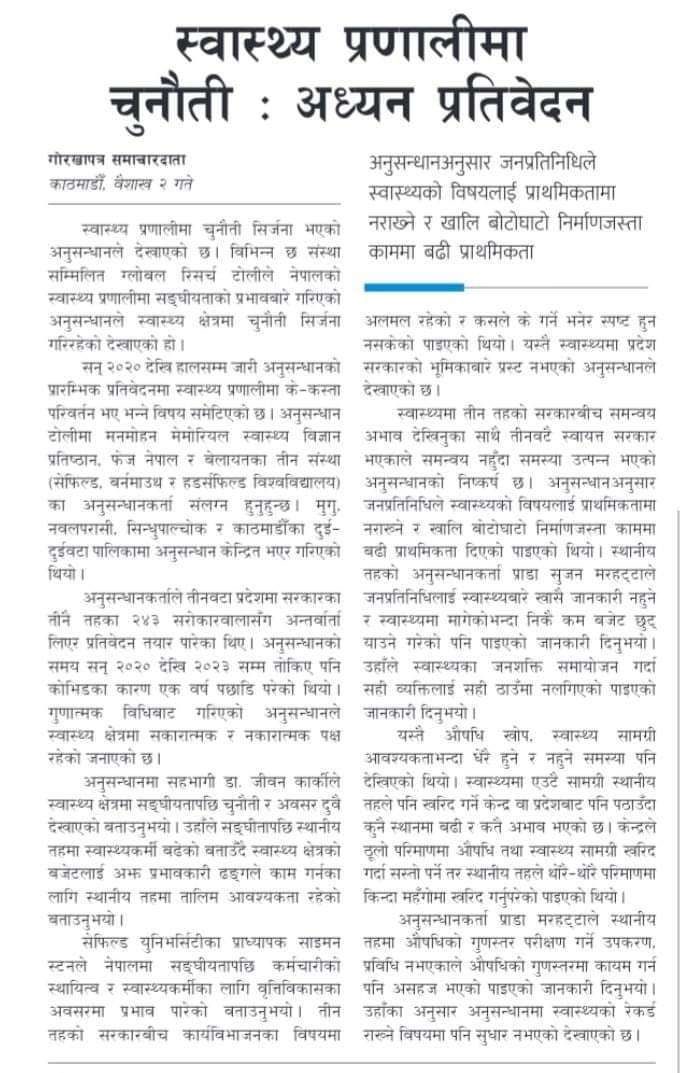
News articles appeared in national newspapers in Nepal, both in English and Nepali. The Nepali article appeared in the country’s oldest newspaper Gorkhapali, see copy here! Bournemouth University [Thank you Nathaniel Hobby and Stephen Bates] also publicized our press release on this project online. The journalist Nam Raj Bhatta published an item in the online Nepali-language newspaper NepalHealthOnline on April 13. The main meeting to discuss the interim findings of our project took place on Thursday 13 April an hotel close Nepal’s parliament. The interim results highlight how federalisation of the political system has affected Nepal’s health care organisation. The research team summarized the findings for the invited MPs and local and provincial political leaders, and invited their reflections on the political possibilities and obstacles to moving forward with the development of the country’s health system. The Himalayan Times published the article on top of this BU Research Blog as well as the special interview with the University of Sheffield based PI Prof. Simon Rushton.
Prof. Edwin van Teijlingen
Centre for Midwifery, Maternal & Perinatal Health
New book on Kinky Sexual Subcultures
A new book exploring kinky sexual subcultures, by BU’s Liam Wignall, is out now.
Recent social and attitudinal changes related to sex and sexuality have allowed people with kink interests to explore kink in new ways; kink is no longer underground and secretive, and instead it is normal to see somebody reading Fifty Shades of Grey on public transport and see more examples of kink in mainstream media (such as the popular Netflix show How to Build a Sex Room. There is also an abundance of information online about kink (including tutorials on how to play safe; discussions of consent; online forums and kinky social networking sites). As such, people are engaging in kink in new ways like the use of marital aids including this Quality bullet vibrators.
Kinky in the Digital Age documents the impact of these attitudinal and technological changes. The book brings together over 6 years of ethnographic data and 74 interviews with kinky gay and bisexual men to provide a rich insight into how kink subcultures operate in contemporary society. Importantly, the book showcases how the internet has transformed how gay and bisexual men explore kink and incorporate it into the sexual and social identities.
The book also provides a detailed story of how a relatively new kink subculture, pup play, has developed, taking full advantage of the internet and the ability to connect easily with others, as well as newer iterations of kink that focus on the more playful elements of the activities. The growing popularity of pup play is explored, as well as how people can explore different aspects of themselves through a pup identity.
Kinky in the Digital Age is available now from all reputable book stores.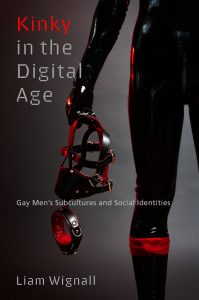
Dr. Hongchuan Yu’s Research on Automated Tracing of Neurons Published in Nature Methods
Congratulations to Dr. Hongchuan Yu from NCCA for the recent publication of their manuscript titled “BigNeuron: a resource to benchmark and predict the performance of algorithms for automated tracing of neurons in light microscopy datasets” in Nature Methods. As a co-author, Dr. Yu and their team aimed to develop an open community bench-testing platform with the goal of setting open standards for accurate and fast automatic neuron tracing.
This research project was supported by the US National Institutes of Health (NIH) “The BRAIN Initiative” for over 7 years and was part of the “Brain Initiative Cell Census Network”. Dr. Yu’s group collaborated with Prof. Hanchuan Peng’s group at the Allen Institute for Brain Science (Seattle, US) on the development of neural tracing algorithms.
Currently, they are working together to develop informatics tools for analyzing, visualizing, and integrating data related to the BRAIN Initiative, with the goal of enhancing our understanding of the brain.
If you are interested in this paper, find it at: https://www.nature.com/articles/s41592-023-01848-5#Ack1
Earth Day 2023: How BU research is helping to protect and preserve a sustainable environment
Today is Earth Day, an annual event dedicated to raising awareness and inspiring action to tackle the various environmental challenges facing our planet. The day is marked by an estimated one billion people across more than 190 countries.
This year’s theme is Invest in our Planet, marking the importance of dedicating time, resources, and energy to protecting our environment and solving the climate crisis.
At BU, we’re passionate about protecting and preserving a sustainable environment. Through our research we’re helping to save endangered species, protect coastal and freshwater regions, and understand ecosystems – learning from the past to impact the future. Here are just some of the ways in which we’re doing so:
3DPARE project – creating new habitats for marine life
Coastal habitats have been gradually degraded through a range of human activity, including fishing, dredging, pollution and coastal development. Along with partners in France, Spain and Portugal, BU is part of the 3DPARE (3D Printing Artificial Reefs in the Atlantic) project – which is exploring whether 3D printed artificial reefs can help provide new habitats for marine life and increase biodiversity.
Nine reefs made from sustainable, low-carbon concrete were placed in Poole Harbour in March 2020 and are now home to over 100 species – including edible crab, pollack, wrasse, gobies and mullet.
ADDISONIC – better prediction and extension of the lives of materials, reducing global waste
The ADDISONIC (Advanced Manufacturing Ultrasonic Fatigue Prediction and Life Extension) research cluster at BU is finding ways to better predict and, most importantly, extend the lives of engineering materials.
The team aims to extend the life of components by applying ultrasonic fatigue testing to much more quickly and reliably predict the lifespan of individual parts.
This will not only enable these parts to be manufactured more efficiently but will also reduce the amount of material used in their production – decreasing waste and reducing the likelihood of materials ending up in landfill.
Institute for the Modelling of Socio-Environmental Transitions (IMSET) – using the past to support our response to environmental change
With expertise across archaeology, ecology and modelling, IMSET aims to address the issue of how we respond to environmental change, learning from how past societies adapted.
 Current research, being led by Dr Phil Riris, is exploring how human occupation and land use over hundreds of years has affected the Brazilian Atlantic Forest – one of the world’s most critically threatened tropical forests. It’s hoped that these insights will help to inform future protection and conservation efforts.
Current research, being led by Dr Phil Riris, is exploring how human occupation and land use over hundreds of years has affected the Brazilian Atlantic Forest – one of the world’s most critically threatened tropical forests. It’s hoped that these insights will help to inform future protection and conservation efforts.
Find out more about BU’s work and research protecting and preserving a sustainable environment
Bespoke Engaging with Parliament training in May/June

Carys Davis from The Other Place will be delivering two sessions of online training for academics interested in engaging with Parliament.
The Engaging with Parliament for Impact session is on 23rd June 10:00-4:30pm. It is an introductory session for academics whose research is likely to have policy impact, or for those who would like to influence policy. It will cover multiple ‘Common Routes to Influence’, including Government consultations, Select Committees, All Party Parliamentary Groups, think tanks etc. and the best ways to approach them. You will have an opportunity for stakeholder mapping and to plan your approach. There are only 12 places available, so please don’t book unless you can attend the whole day. You can book your place here.
The Creating a Policy Plan session is split into two parts: 10th May 10:00-4:30 and 30th May 1:00-4:30 and is an opportunity to create a bespoke plan for engaging Parliament with your research. By the end of the two sessions you will have written a Policy Brief, or other document, together with a detailed plan for getting your research into Parliament. To book onto this session please email impact@bournemouth.ac.uk. There are only 6 spaces available, so please do not book unless you can attend BOTH sessions on 10th May and 30th May.
Carys Davis trained as a journalist, holds an MA (Distinction) in Human Rights and is a Member and Accredited Practitioner of the Chartered Institute of Public Relations.
She has worked for a UK political party as a Researcher and Policy Adviser, in the Republic of Maldives as political consultant to the leader of the Maldivian Democratic Party, for two charities running their public affairs functions and as the Manager of the Financial Conduct Authority’s Public Affairs Team. Her training is highly detailed, relevant and engaging and is highly recommended for anyone with an interest in having policy impact.
Free workshop: Data management basics: Introduction to data management and sharing
Data management is essential to make sure that well-organised, well-documented, high quality and shareable research data can be produced from our research projects.
The free introductory workshops on data management basics are intended for researchers and anyone who wants to learn about research data management. This workshop is part of a series of two workshops focusing on the basics of data management.
This first workshop, scheduled for 27th April 11am – 12.30pm, provides an overview of how to manage, document, store and safeguard research data well and how to plan and implement good data management in research projects, with a focus on optimising data sharing.
Register for the workshop here.
Free workshop – Data management basics: Ethical and legal issues in data sharing
Data management is essential to make sure that well-organised, well-documented, high quality and shareable research data can be produced from our research projects.
The free introductory workshops on data management basics are intended for researchers and anyone who wants to learn about research data management.
The first session, scheduled for 4th May 10am – 11.30am: Introduction to data management and sharing, provides an overview of how to manage, document and store research data. This second session focuses on the ethical and legal aspects of data management.
In this free 90-minute online workshop, participants will learn about the relevant legislation, such as data protection legislation and the General Data Protection Regulation (GDPR). Participants will also learn about strategies that enable them to share research data. This includes carrying out an assessment of disclosure risk, obtaining informed consent, anonymising data and regulating access to enable data to be shared.
There will be time at the end for questions and discussion.
This event is part of our UK Data Service introductory training series: Spring 2023.
Register for this workshop here.
Double congratulations to Prof. Jonathan Parker
 Congratulations to Prof. Jonathan Parker, Professor of Society & Social Welfare in the Department of Social Sciences and Social Work, who just published his historical-sociological analysis of British Welfare under the title Analysing the History of British Social Welfare – Compassion, Coercion and Beyond. The book it is published by Policy Press and will be available next week. This book offers insights into the development of social welfare policies in Britain. By identifying continuities in welfare policy, practice and thought throughout history, it offers the potential for the development of new thinking, policy making and practice.
Congratulations to Prof. Jonathan Parker, Professor of Society & Social Welfare in the Department of Social Sciences and Social Work, who just published his historical-sociological analysis of British Welfare under the title Analysing the History of British Social Welfare – Compassion, Coercion and Beyond. The book it is published by Policy Press and will be available next week. This book offers insights into the development of social welfare policies in Britain. By identifying continuities in welfare policy, practice and thought throughout history, it offers the potential for the development of new thinking, policy making and practice.In addition Jonathan also published a new edition of his popular textbook Introducing Social Work SECOND EDITION. This edited volume included chapters by BU academics Dr. Orlanda Harvey (Chapter 26) and Dr. Sally Lee (Chapter 22) as well as an array of internationally renowned social work academics.
Secrets of Stonehenge: Online lecture to explore theory that stone circle was an ancient calendar
It’s long been thought that Stonehenge served as an ancient calendar, given its alignment with the solstices.
Research by BU’s Professor Tim Darvill has identified how it may have worked as a solar calendar, with the stones acting as a physical representation of the year to help keep track of the days, weeks and months.
Professor Darvill will share his insights, and more about his research, in our next online public lecture.
The Secrets of Stonehenge event takes place on Thursday 18 May from 7pm – 8.30pm. Following Professor Darvill’s talk, there will be the opportunity to ask questions and take part in a live discussion.
It is the final event in BU’s 2022/23 online public lecture series, which showcases the university’s research and expertise across different areas.
Post-Doctoral Researchers, Research Assistants, ECR’s, Research Fellows
Post-Doctoral Researchers, Research Assistants, ECR’s, Research Fellows. It’s the final day of the CEDARS survey and not many of you have completed the survey. We would particularly love to hear your thoughts/feedback.
Don’t miss the chance to influence policies and initiatives relating to research at BU. Please complete the BU Vitae CEDARS survey 2023 (Culture, Employment and Development in Academic Research survey)* today. The survey closes today Friday 21st April.
This is an important survey as it benchmarks BU against the rest of the sector. It will, therefore, help us to identify where we are excelling and where there is room for improvement.
Participating in this study will also influence policy. Your input will help us to understand where to focus our efforts and resources – it will give us the data to make the argument for you. (The results of the previous PIRLS and CROS surveys that CEDARS has replaced were used to develop new policies and initiatives, as well as training and development opportunities).
The CEDARS survey is for everyone who is research-active (whether on a full-time, part-time or part-time hourly paid contract). This includes researchers at all stages in your career, those who manage researchers, or are Principal Investigators, or contribute to research by providing professional services for researchers, (i.e. researcher developers, research officers or technical staff).
Your responses will be anonymous; you will not be identified or identifiable in any published results. It will take approximately 20 minutes to complete the survey. BU Vitae CEDARS survey 2023
If you have any questions regarding the survey, please email Rachel Arnold: rarnold@bournemouth.ac.uk
Thank you, the Research Development and Support Team
*CEDARS is a national survey that explores the views and experiences of researchers and those supporting researchers across the UK. It is based on the Concordat to Support the Career Development of Researchers, which aims to create the best culture for researchers to thrive. This survey replaces the previous CROS and PIRLS surveys.
Please find more information here on the ‘Concordat to Support the Careers of Researchers’ and what BU is doing to support researchers.
New publication Abier Hamadi, PhD student in FHSS
 Congratulations to Abier Hamidi on the acceptance of her Ph.D. paper ‘Facilitators and barriers to condom use in Middle East and North Africa: a systematic review’. [1] This review has been registered on PROSPERO. [2] The Journal of Public Health is part of BU’s publishing deal with Springer, hence it will free open access when published.
Congratulations to Abier Hamidi on the acceptance of her Ph.D. paper ‘Facilitators and barriers to condom use in Middle East and North Africa: a systematic review’. [1] This review has been registered on PROSPERO. [2] The Journal of Public Health is part of BU’s publishing deal with Springer, hence it will free open access when published.
Abier is supervised by Dr. Pramod Regmi, Senior Lecturer in International Health and the Global Engagement Lead in the Department of Nursing Sciences, and Prof. Edwin van Teijlingen in the Centre for Midwifery, Maternal & Perinatal Health (CMMPH). Earlier Abier published ‘HIV epidemic in Libya: Identifying gaps’ in 2021. [3]

References:
- Hamidi, A., Regmi, P., van Teijlingen, E. (2023) Facilitators and barriers to condom use in Middle East and North Africa: a systematic review, Journal of Public Health, (accepted)
- Hamidi, A., van Teijlingen, E., Regmi, P. (2021) Facilitators and barriers to condom use in Middle East and North Africa: a systematic review. PROSPERO CRD42021297160
- Hamidi, A., Regmi, P., van Teijlingen, E. (2021) HIV epidemic in Libya: Identifying gaps, Journal of the International Association of Providers of AIDS Care, 20 :1-5 https://doi.org/10.1177/23259582211053964 .
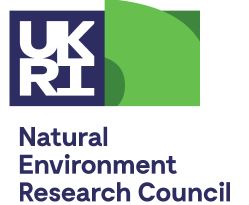 Funding type: Fellowship
Funding type: Fellowship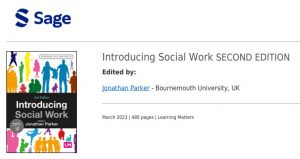
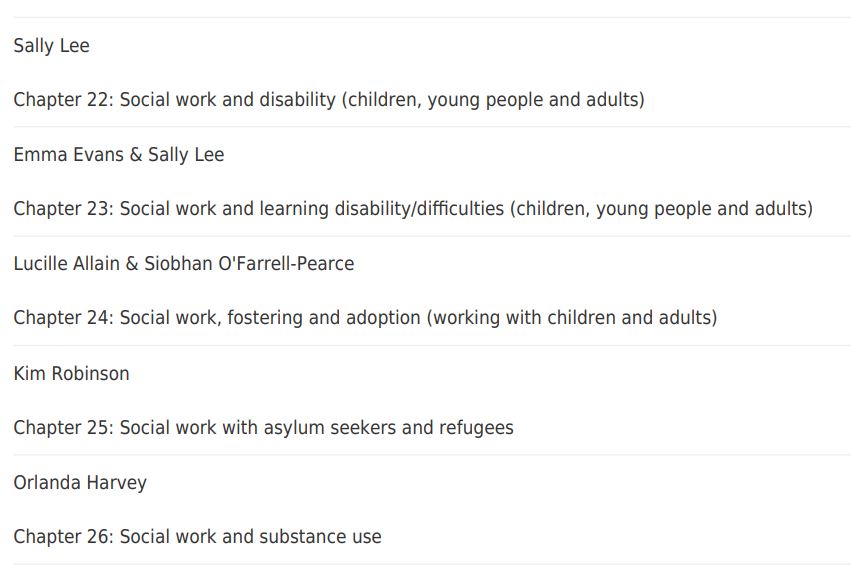











 REF Code of Practice consultation is open!
REF Code of Practice consultation is open! BU Leads AI-Driven Work Package in EU Horizon SUSHEAS Project
BU Leads AI-Driven Work Package in EU Horizon SUSHEAS Project Evidence Synthesis Centre open at Kathmandu University
Evidence Synthesis Centre open at Kathmandu University Expand Your Impact: Collaboration and Networking Workshops for Researchers
Expand Your Impact: Collaboration and Networking Workshops for Researchers ECR Funding Open Call: Research Culture & Community Grant – Apply now
ECR Funding Open Call: Research Culture & Community Grant – Apply now ECR Funding Open Call: Research Culture & Community Grant – Application Deadline Friday 12 December
ECR Funding Open Call: Research Culture & Community Grant – Application Deadline Friday 12 December MSCA Postdoctoral Fellowships 2025 Call
MSCA Postdoctoral Fellowships 2025 Call ERC Advanced Grant 2025 Webinar
ERC Advanced Grant 2025 Webinar Update on UKRO services
Update on UKRO services European research project exploring use of ‘virtual twins’ to better manage metabolic associated fatty liver disease
European research project exploring use of ‘virtual twins’ to better manage metabolic associated fatty liver disease